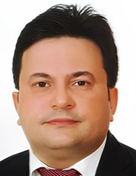Special Issue on AI-Driven Integration of Terrestrial and Non-Terrestrial Networks: Foundations, Methodologies, and Applications
Published 10 July, 2025
The rapid growth of wireless communication technologies, particularly the integration of terrestrial and non-terrestrial networks (NTNs), is reshaping the future of global connectivity. As the demand for high-speed, reliable, and ubiquitous communication increases, terrestrial networks alone struggle to meet these needs, especially in remote, rural, and underserved regions. Non-terrestrial networks, which encompass satellite, high-altitude platform systems (HAPS), and unmanned aerial vehicles (UAVs), offer a promising solution to bridge this gap by extending coverage and providing seamless service where terrestrial infrastructure is unavailable or inefficient.
In recent years, the convergence of artificial intelligence (AI) and communication technologies has gained significant attention for its potential to optimize network operations, enhance performance, and automate management across both terrestrial and non-terrestrial domains. AI-driven solutions, including machine learning (ML), reinforcement learning (RL), and deep learning (DL), have shown remarkable promise in addressing critical challenges such as network resource allocation, traffic management, interference mitigation, routing, energy optimization, and service quality enhancement.
This special issue seeks to explore the foundations, methodologies, and applications of AI-driven integration of terrestrial and non-terrestrial networks. It aims to highlight state-of-the-art AI techniques that can improve the interoperability, reliability, scalability, and performance of hybrid networks in real-world scenarios.
The topics include but are not limited to:
- Al enabled Beamforming techniques for energy efficient Integrated TN-NTN networks
- Multiple access schemes, e.g., RSMA, NOMA for integrated TN-NTN systems
- Al enabled Backscatter communications for Integrated TN-NTN networks
- Energy harvesting, wireless information, and power transfer for integrated TN-NTN networks
- Al enabled intelligent reflecting surface design for Integrated TN-NTN networks
- Holographic MIMO for Integrated TN-NTN networks
- PHY algorithms and protocol designs for integrated TN-NTN
- AI enabled optimization-oriented designs for Integrated TN-NTN
- Satellite communications and networking, e.g., LEOs, ground-to-space, space-to-ground links
- AI enabled cost and power efficient design of Integrated TN-NTN networks
- AI backed security, privacy, and interference exploitation challenges in integrated TN-NTN based systems
- AI algorithms for joint TN and NTN resource allocations
- Generative AI for TN and NTN
Manuscript Submission Information
The journal’s submission platform (Editorial Manager®) is now available for receiving submissions to this Special Issue. Please refer to the Guide for Authors to prepare your manuscript, and select the article type of “VSI:AI-TNTN” when submitting your manuscript online. Authors should consult the link for submission instructions: https://www.editorialmanager.com/intecom/default2.aspx. The Guide for Authors could be found on the Journal Homepage here: https://www.sciencedirect.com/journal/journal-of-information-and-intelligence/publish/guide-for-authors.
Timeline
- Submission deadline: Janurary 15, 2026
- Acceptance deadline: Feburary 31, 2026
- Publication Date: May 31, 2026
Guest Editors:

Weiwei Jiang
Assistant Professor, Beijing University of Posts and Telecommunications, China
Email: jww@bupt.edu.cn
Dr. Weiwei Jiang received the B.Sc. and Ph.D. degrees from the Department of Electronic Engineering, Tsinghua University, Beijing, China, in 2013 and 2018, respectively. He is currently an assistant professor with the School of Information and Communication Engineering, Beijing University of Posts and Telecommunications, and Key Laboratory of Universal Wireless Communications, Ministry of Education. His current research interests include artificial intelligence, machine learning, big data, wireless communication and edge computing. He has published more than 60 academic papers in IEEE Trans and other journals, with more than 3900 citations in Google Scholar. He is one of 2023 and 2024 Stanford's List of World's Top 2% Scientists.

Yansha Deng
Reader, King’s College London, United Kingdom.
Email: yansha.deng@kcl.ac.uk
Dr Yansha Deng is a Reader in the Department of Engineering at King’s College London, London, United Kingdom. She has secured more than £2.6 million of research funding as the Principal Investigator, £14 million of research funding as the Co-Investigator, and has received the EPSRC NIA award. She has published 120+ journal papers and 60+ IEEE/ACM conference papers. She is currently the Area Editor of IEEE Communications Letters since 2023, the Associate Editor of IEEE Transactions on Wireless Communications since 2025, the Associate Editor of IEEE Communications Surveys and Tutorials since 2022, the Associate Editor of IEEE Transactions on Communications from 2017 to 2023, the Associate Editor of IEEE Transactions on Machine Learning in Communications and Networking since 2022, the Associate Editor of IEEE Transactions on Molecular, Biological and Multi-scale Communications since 2019, the Associate Editor of IEEE Open Journal of Communications Society since 2019 and the Vertical Area Editor of IEEE Internet of Things Magazine since 2021.

George Alexandropoulos
Associate Professor, National and Kapodistrian University of Athens, Greece
Email: alexandg@di.uoa.gr
George C. Alexandropoulos received the Engineering Diploma (Integrated M.S.c), M.A.Sc., and Ph.D. degrees in Computer Engineering and Informatics from the School of Engineering, University of Patras, Greece in 2003, 2005, and 2010, respectively. He has held senior research positions at various Greek universities and research institutes, and he was a Senior Research Engineer and a Principal Researcher at the Mathematical and Algorithmic Sciences Lab, Paris Research Center, Huawei Technologies France, and at the Technology Innovation Institute, Abu Dhabi, United Arab Emirates, respectively. He is currently an Associate Professor with the Department of Informatics and Telecommunications, School of Sciences, National and Kapodistrian University of Athens (NKUA), Greece and an Adjunct Professor with the Department of Electrical and Computer Engineering, University of Illinois Chicago, Chicago, IL, USA. His research interests span the general areas of algorithmic design and performance analysis for wireless networks with emphasis on multi-antenna transceiver hardware architectures, full duplex MIMO, active and passive RISs, ISAC, millimeter wave and THz communications, as well as distributed machine learning algorithms. He currently serves as an Editor for IEEE Transactions on Communications, IEEE Transactions on Green Communications and Networking, IEEE Wireless Communications Letters, Frontiers in Communications and Networks, and the ITU Journal on Future and Evolving Technologies. Prof. Alexandropoulos is a Senior Member of the IEEE Communications, Signal Processing, Vehicular Technology, and Information Theory Societies, the Chair of the EURASIP Technical Area Committee on Signal Processing for Communications and Networking, as well as a registered Professional Engineer of the Technical Chamber of Greece. From 2022 to 2024, he was a Distinguished Lecturer of the IEEE Communications Society. He has participated and/or technically managed more than 15 European Union, international, and Greek research, innovation, and development projects, including the H2020 RISE‑6G, SNS JU TERRAMETA, SNS JU 6G-DISAC, and ESA PRISM projects dealing with RIS-empowered smart wireless environments, THz RISs, distributed ISAC, and RIS demonstration for localization and mapping, respectively. He was the recipient of the best Ph.D. thesis award 2010, IEEE Communications Society Best Young Professional in Industry Award 2018, EURASIP Best Paper Award of the Journal on Wireless Communications and Networking 2021, IEEE Marconi Prize Paper Award in Wireless Communications 2021, Best Paper Award from the IEEE GLOBECOM 2021, IEEE Communications Society Fred Ellersick Prizes 2023 and 2024, IEEE Communications Society Leonard G. Abraham Prize 2024, and NKUA’s Research Excellence Award for the academic year 2023-2024. More information is available at www.alexandropoulos.info

Rohit Singh
Assistant Professor, NIT Jalandhar, India
Email: rohits@nitj.ac.in
Rohit Singh (Member, IEEE) received the B.Tech and M. Tech degree from M.I.T. Moradabad, and N.I.T., Jalandhar, India, respectively. From 2017 to 2021, he was a doctoral researcher at the Indian Institute of Technology Ropar, India. Currently, he is an assistant professor in the department of electronics and communication engineering at Dr. B. R. Ambedkar National Institute of Technology, Jalandhar. He has addressed issues related to vehicular radar and communication, and published several papers in reputed IEEE journals and conferences of the wireless domain. His current interest includes communication technologies for 6G and beyond, IMT 2030 aspects, intelligent surfaces, and indexed modulation.

Wonjae Shin
Associate Professor, Korea University, South Korea
Email: wjshin@korea.ac.kr
Wonjae Shin is an Associate Professor at the School of Electrical Engineering, Korea University, Seoul, South Korea. He received his B.S. and M.S. degrees from the Korea Advanced Institute of Science and Technology (KAIST) in 2005 and 2007, respectively, and his Ph.D. degree in Electrical and Computer Engineering from Seoul National University (SNU) in 2017. From 2007 to 2014, Dr. Shin was a Member of the Technical Staff at the Samsung Advanced Institute of Technology and Samsung Electronics, where he contributed to next-generation wireless communication networks, particularly for 3GPP LTE/LTE-Advanced standardization. He later held faculty positions at Pusan National University and Ajou University before joining Korea University. From 2016 to 2018, he has also conducted research as a Postdoctoral Fellow and Visiting Scholar at Princeton University, USA.
Dr. Shin’s research interests focus on the design and analysis of future wireless communication systems, including non-terrestrial networks, interference-limited networks, and AI/ML for wireless networks. His work has earned numerous accolades, including the Fred W. Ellersick Prize and the IEEE Communications Society Asia-Pacific Outstanding Young Researcher Award in 2020, as well as multiple best paper awards. He has also been recognized with the Samsung CEO Award, SAIT Patent Award, and Samsung Journal of Innovative Technology Award. An active contributor to the research community, Dr. Shin serves as an Associate Editor for the IEEE Internet of Things Journal and the IEEE Open Journal of the Communications Society. He has delivered over 50 Invited & Tutorial speeches, including as a Tutorial Speaker at IEEE GLOBECOM 2023, IEEE WCNC 2023, and IEEE BlackSeaCom 2024.

Ali Görçin
Assistant Professor, Istanbul Technical University, Türkiye
Email: aligorcin@itu.edu.tr, ali.gorcin@gmail.com
Ali Görçin graduated from Istanbul Technical University with B.Sc. in Electronics and Telecommunications Engineering and completed his master’s degree at the same university. After working at Turkish Science Foundation (TUBITAK) on research projects, he moved to the U.S.A. to pursue PhD degree in University of South Florida on wireless communications. He worked for Anritsu Company during his tenure in USF, Reverb Networks and Viavi Solutions later on. He is currently holding an assistant professorship position in Istanbul Technical University and also serving as the president of TÜBİTAK BİLGEM (Informatics and Information Security Research Center) of Türkiye. His research topics cover implementation of artificial intelligence to wireless communications, reconfigurable intelligent surfaces, terahertz communications, non-terrestrial networks, and signal detection, estimation & identification. He holds numerous awards including IEEE Transaction on Communications Exemplary Reviewer Award and VTC2023-Spring Best Paper Award.